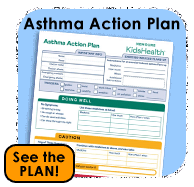What if Kids Don’t Take Their Asthma Medicine?
One of the best ways to help kids manage asthma is to make sure they take their medicine as prescribed by the doctor. Kids need to take these medicines as directed, even when they feel fine.
The effect of skipping medicine will vary depending on what kind of medicine it is.
What if Kids Miss a Dose of Long-Term Control Medicine?
Long-term control medicines work over time to keep airways clear and prevent asthma symptoms. They’re usually taken daily.
Not taking a dose of long-term control medicine (also called controller or maintenance medicine) might seem to have no immediate or dramatic effect. But over time, this can let airways get more irritated, especially if a child comes in contact with a trigger. Skipping doses can put a child at risk for an asthma flare-up, or attack.
Make sure your child always takes long-term control medicine as directed to help prevent flare-ups.
What if Kids Miss a Dose of Quick-Relief Medicine?
Quick-relief medicines work right away to handle the symptoms of asthma flare-ups when they happen. These medicines often are inhaled directly into the lungs. Within minutes, they open up the airways and relieve symptoms like wheezing, coughing, and shortness of breath.
Not taking quick-relief medicines (also called rescue or fast-acting medicines) during an asthma flare-up can be very harmful. A child might not be able to take a deep breath, and the airways can continue to tighten until the child must go to the ER.
Make sure your child always has quick-relief medicine handy in case of an emergency.
What Else Should I Know?
Involving kids in their asthma care will help them take their medicines on time, every time. Explain how the medicines work and how much your child must take. Having an asthma action plan can help both of you learn what you need to know.
It’s also important to stress to kids that:
- They should take their long-term control medicines as directed, even when feeling well.
- They must keep their quick-relief medicine on hand, no matter where they are.
You can help by reminding your child to take the long-term control medicine as directed and to carry the quick-relief medicine when leaving the house. Also make sure that you don’t run out of medicine.

